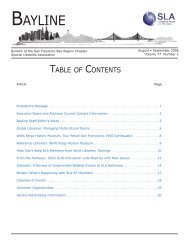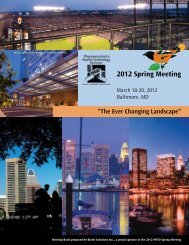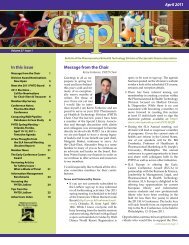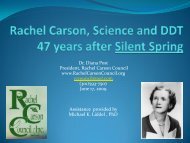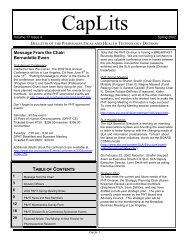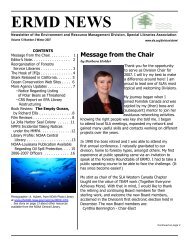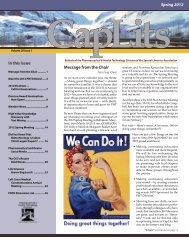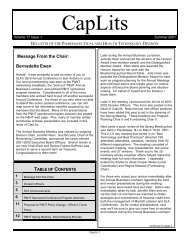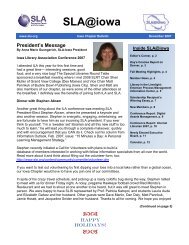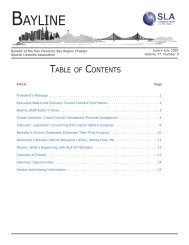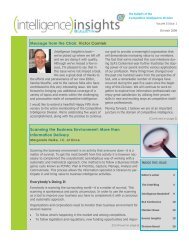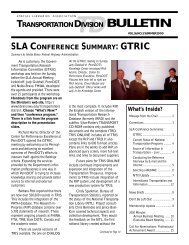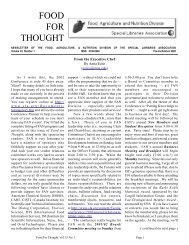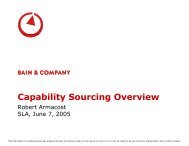Education Libraries - Special Libraries Association
Education Libraries - Special Libraries Association
Education Libraries - Special Libraries Association
Create successful ePaper yourself
Turn your PDF publications into a flip-book with our unique Google optimized e-Paper software.
Feedback, focuses on the creation of indicators by<br />
learning specialists to ensure student achievement and<br />
future growth. Zmuda and Harada outline the different<br />
forms of assessment and provide examples of each.<br />
Additionally they focus on the challenges of assessment<br />
both as a tool of measurement and in terms of<br />
collaboration amongst classroom teachers and learning<br />
specialists. Providing insight into false notions of<br />
learning specialists’ responsibility in assessment of<br />
curricular goals, the authors effectively illustrate the<br />
need for learning specialists to become true partners in<br />
the delivery and assessment of learning while placing the<br />
library media specialist at the center of the more<br />
“authentic” aspects of learning (etc. analysis, drawing<br />
conclusions, applying knowledge, etc.).<br />
In the conclusion, the authors focus on the changing<br />
landscape of information resources and the type of<br />
sources students will need to be successful learners in a<br />
digital age. While Zmuda and Harada provide collection<br />
development criteria for library media specialists in<br />
building these “new” collections, the analysis is limited<br />
and a more in-depth review of the uses and expectations<br />
of users of digital collections and web 2.0 tools is<br />
necessary to understand if or how they should be<br />
implemented into a school library.<br />
Learning <strong>Special</strong>ists: Meeting the Learning Imperative<br />
for the 21 st Century provides a practical framework for<br />
implementing values based practices into the classroom.<br />
With tables, rubrics, assessments, and examples from<br />
both theoretical perspectives and practical examples, the<br />
authors have created a highly useful resource that<br />
focuses on actualizing improvements in the school<br />
through collegiality rather than idealistic theory that<br />
sometimes permeates literature in education.<br />
Erin Fields, is a Reference and Instruction Library at<br />
York University, Toronto. Email: efields@yorku.ca<br />
Online Resources: Conservation & Archiving<br />
Institute for Conservation of Historic and Artistic Works<br />
(AIC)<br />
AIC exists to support the conservation professionals who<br />
preserve our cultural heritage. As the only national<br />
membership organization in the United States dedicated to the<br />
preservation of cultural material, the AIC plays a crucial role<br />
in establishing and upholding professional standards,<br />
promoting research and publications, providing educational<br />
opportunities, and fostering the exchange of knowledge<br />
among conservators, allied professionals, and the public.<br />
http://aic.stanford.edu/about/index.html<br />
The Library of Congress Preservation: Collections Care<br />
and Conservation<br />
Includes these topics and more: Paper, Books/Bindings,<br />
Photographs, Scrapbooks, Leather Reformatting, Magnetic<br />
Media, Recorded Sound, Film, and Mats & Frames.<br />
http://www.loc.gov/preserv/pubscare.html<br />
National Park Service Conserve-o-Grams<br />
Conserve-o-Grams are short, focused leaflets about caring for<br />
museum objects, published in loose-leaf format. This is a<br />
selected list of documents that might be of interest to readers.<br />
http://www.nps.gov/history/museum/publications/conserveogr<br />
am/cons_toc.html<br />
Archival and Manuscript Collections and Rare Books<br />
19/1 What makes a Book Rare? 1993<br />
19/2 Care and Security of Rare Books 1993<br />
19/3 Use and Handling of Rare Books 1993<br />
19/4 Archives: Preservation Through Photocopying 1993<br />
19/11 Preservation Reformatting: Selecting a Copy<br />
Technology 1995<br />
19/12 Contracting for Reformatting of Photographs 1995<br />
19/13 Preservation Reformatting: Inspection of Copy<br />
Photographs 1995<br />
19/14 Judging Permanence for Reformatting Projects:<br />
Paper and Inks 1995<br />
19/15 Storing Archival Paper-Based Materials 1996<br />
19/16 Housing Archival Paper-Based Materials 1996<br />
19/17 Handling Archival Documents and Manuscripts<br />
1996<br />
History Detectives on PBS Investigative Techniques Pages<br />
History Detectives is devoted to exploring the complexities of<br />
historical mysteries, searching out the facts, myths and<br />
conundrums that connect local folklore, family legends and<br />
interesting objects. Traditional investigative techniques,<br />
modern technologies, and plenty of legwork are the tools the<br />
History Detectives team of experts uses to give new - and<br />
sometimes shocking - insights into our national history. Their<br />
Investigative Techniques page includes topics on Document<br />
Examination: Testing documents identifies forged and<br />
authentic papers, as well as Paper Analysis: Determining age,<br />
make-up and origin.<br />
http://www.pbs.org/opb/historydetectives/<br />
<strong>Education</strong> <strong>Libraries</strong>, Volume 31, No. 2, Winter 2008 63



